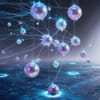Artificial intelligence (AI) is moving towards self-organization, where autonomous agent groups can adapt, learn, and evolve without external direction. This shift enables AI systems to become more resilient, flexible, and scalable.
Autonomous agent groups, composed of individual agents with unique capabilities, can self-organize to achieve complex goals. These agents interact, cooperate, and adapt to their environment, mimicking natural systems like swarms, flocks, and colonies.
Self-organization in AI has far-reaching implications, including enhanced problem-solving, improved robustness, and increased autonomy. As AI continues to evolve, autonomous agent groups are poised to revolutionize various fields, from robotics and finance to healthcare and transportation.


